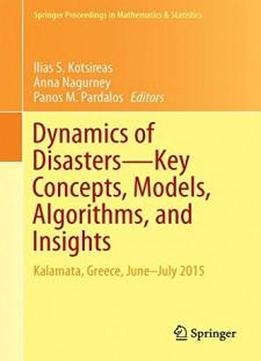
Dynamics Of Disasters―key Concepts, Models, Algorithms, And Insights: Kalamata, Greece, June–july 2015 (springer Proceedings In Mathematics & Statistics)
by Panos M. Pardalos /
2016 / English / PDF, EPUB
12.9 MB Download
This volume results from the “Second International Conference on
Dynamics of Disasters” held in Kalamata, Greece, June 29-July 2,
2015. The conference covered particular topics involved in natural
and man-made disasters such as war, chemical spills, and wildfires.
Papers in this volume examine the finer points of disasters
through:
This volume results from the “Second International Conference on
Dynamics of Disasters” held in Kalamata, Greece, June 29-July 2,
2015. The conference covered particular topics involved in natural
and man-made disasters such as war, chemical spills, and wildfires.
Papers in this volume examine the finer points of disasters
through:Critical infrastructure protection
Critical infrastructure protectionResiliency
ResiliencyHumanitarian logistic
Humanitarian logisticRelief supply chains
Relief supply chainsCooperative game theory
Cooperative game theoryDynamical systems
Dynamical systemsDecision making under risk and uncertainty
Decision making under risk and uncertaintySpread of diseases
Spread of diseasesContagion
ContagionFunding for disaster relief
Funding for disaster reliefTools for emergency preparedness
Tools for emergency preparednessResponse, and risk mitigation
Response, and risk mitigation
Multi-disciplinary theories, tools, techniques and
methodologies are linked with disasters from mitigation and
preparedness to response and recovery. The interdisciplinary
approach to problems in economics, optimization, government,
management, business, humanities, engineering, medicine,
mathematics, computer science, behavioral studies, emergency
services, and environmental studies will engage readers from a
wide variety of fields and backgrounds.
Multi-disciplinary theories, tools, techniques and
methodologies are linked with disasters from mitigation and
preparedness to response and recovery. The interdisciplinary
approach to problems in economics, optimization, government,
management, business, humanities, engineering, medicine,
mathematics, computer science, behavioral studies, emergency
services, and environmental studies will engage readers from a
wide variety of fields and backgrounds.










